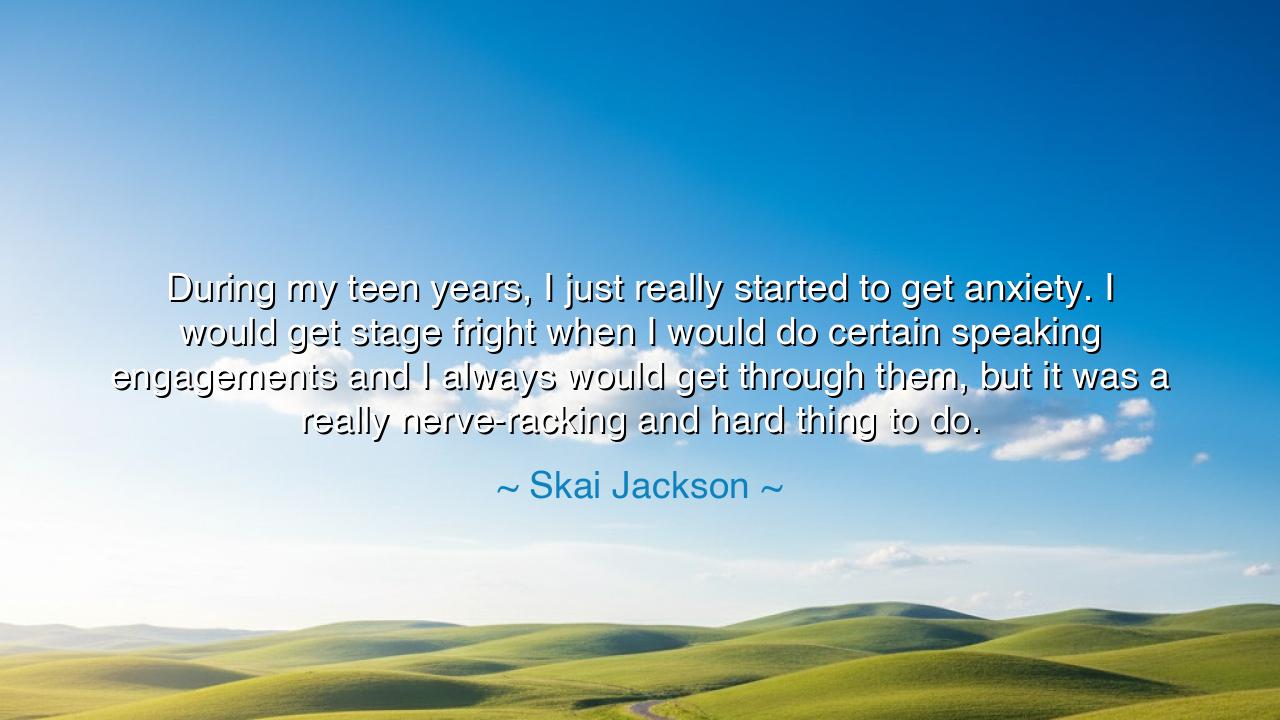
During my teen years, I just really started to get anxiety. I
During my teen years, I just really started to get anxiety. I would get stage fright when I would do certain speaking engagements and I always would get through them, but it was a really nerve-racking and hard thing to do.






Hear the candid words of Skai Jackson, who spoke not from a pedestal of triumph but from the vulnerability of her youth: “During my teen years, I just really started to get anxiety. I would get stage fright when I would do certain speaking engagements and I always would get through them, but it was a really nerve-racking and hard thing to do.” These words, though simple, are filled with courage, for to confess one’s fear is already an act of strength. They reveal that behind every polished performance, behind every bright light of fame, there lies the trembling heart of a human being learning to overcome.
For the trial of anxiety is not new. Even in ancient days, orators trembled before speaking in the forum, warriors quaked before entering the arena, and poets faltered before reciting their verse. To feel fear is not to be weak—it is to be alive, for the body and spirit know the weight of the task before them. What matters most is not the absence of fear, but the will to endure it. Skai declares that though the stage fright shook her, she “always would get through them.” This is the quiet heroism of persistence: to continue despite trembling.
History gives us many examples. Consider the mighty Demosthenes, greatest of the Athenian orators. As a youth, he stammered and faltered so terribly that others mocked him. Yet through determination, speaking with pebbles in his mouth and shouting his words against the roar of the sea, he conquered his fear and weakness. His speeches would later shake the halls of Greece and move nations. Like Skai, he knew the nerve-racking trial of performance, but he also knew the triumph that comes from facing it again and again.
The meaning of Skai’s words is thus twofold. First, they remind us that teen years are often a crucible, where identity is still forming and the weight of expectation can feel unbearable. To stumble in these years is not failure but growth, for it is in this time that the spirit learns resilience. Second, they teach that fear itself is not the enemy—it is the threshold. By walking through fear, one gains strength that cannot be learned in comfort. Each time Skai faced the stage, though her heart pounded, she emerged stronger, more seasoned, more ready for the next trial.
We must also see in her story the deeper lesson of honesty. Too often, the world expects its performers and leaders to appear fearless, to hide their trembling. Yet by confessing her struggle, Skai becomes a guide for countless others who wrestle with the same invisible burden. She shows that to admit anxiety is not weakness but wisdom, and that courage is not the absence of fear but the will to face it with open eyes. In this, her words become not only personal testimony but a gift to those who feel alone in their battles.
Therefore, my child, take this teaching to heart: when you feel the cold grip of fear upon you, do not flee from it. Stand, breathe, and move forward anyway. Remember that even the bravest have trembled, even the greatest have faltered, and even the strongest have confessed, “This was hard.” What makes them great is not that they felt no fear, but that they walked through it. Each time you endure, your spirit grows taller, your voice stronger, your courage more unshakable.
What, then, must you do? Embrace the small battles as training for greater ones. If you must speak though your hands shake, speak. If you must sing though your voice trembles, sing. If you must stand though your knees quiver, stand. Do not measure success by perfection, but by persistence. For each time you rise again, fear loses its grip, and you claim another step in your journey toward strength.
So let Skai Jackson’s words endure as both confession and inspiration: “I would get through them, but it was a really hard thing to do.” This is the essence of courage—not ease, not fearlessness, but endurance. Remember this, and when the moment comes for you to face your own stage, you too will stand, trembling yet triumphant, proving that the heart that endures is greater than the fear that tests it.






AAdministratorAdministrator
Welcome, honored guests. Please leave a comment, we will respond soon